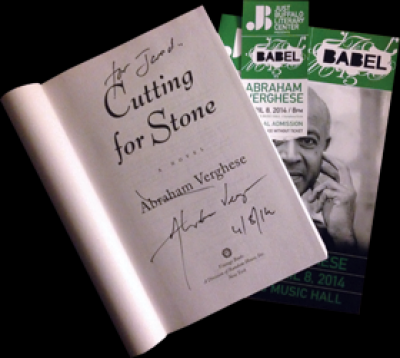It is interesting to see how Just Buffalo Literary Center’s Babel series has evolved over the years. Beyond locale (now residing at Kleinhans Music Hall after its origins in Asbury Hall at Babeville), artistic director (Barbara Cole seamlessly transitioning on from Michael Kelleher), and audience (last night’s crowd had to be the largest since Salman Rushdie and the season’s total far and away the best in its seven years), we now are beginning to see how expansive the title of “writer” truly is. The announcement of next season’s final speaker being Patti Smith shows just how wide a net this metamorphosis spreads, but it was Abraham Verghese’s visit that showed its possibilities.
I’m not saying he’s the first attendee that’s more than an author—he just may be the first to consider another vocation paramount. There have been some wonderful visitors from all over the world who took their fame, celebrity, and voice from writing and turned it into something grander (I think of Maxine Hong Kingston and her anti-war activism), but here’s a man who found literature as a result of his choosing to become a doctor. As he stated onstage, it was a book that brought him to medicine and ultimately medicine that brought him to writing a book. There is no distinction between the two occupations in his eyes. He resists the “two hat” label and confidently explains how it’s his passion in medicine that allows him to write.
Verghese’s Babel conversation came after visiting with students on the University at Buffalo’s Medical Campus, another seeming first for the series which usually has its speakers talking to English majors or younger children about literature. He didn’t bring any notes with him, but instead walked freely at the foot of the stage to engage his audience like he would classes at Stanford as tenured professor for the Theory and Practice of Medicine and Associate Chair of Internal Medicine. Rather than speak of his style (which he touched upon during the Q&A session as being one where outlines don’t work because he honestly doesn’t know where his characters will take him) he spoke of the trajectory a boy of South Indian descent born in Ethiopia took to become the best-selling author he has.
He talked a lot about fate and decisions that may not have been the safest or smartest, but provided him a life he wouldn’t give up. His medical school education was stopped by Civil War in Ethiopia; his lack of an undergraduate degree meant he couldn’t transfer to an America university (where his parents had already moved). So he worked as an orderly for a year in New Jersey before finishing his degree in India, returning to the US for his residency. Quick to say he was anything but gifted at school (unlike his MIT engineering professor brother), he considers medicine a vocation anyone can perform if willing to work hard. His most informative education moment coming not from the classroom, but those patients in New Jersey he cared for overnight when the doctors were all at home.
He came to medicine after reading W. Somerset Maugham’s Of Human Bondage (a book he thought “held promise” in its title after finishing Lady Chatterley’s Lover at age eight and a half and Lolita at nine). It was the line at hospital “There was humanity there in the rough, the materials the artist worked on; and Philip felt a curious thrill when it occurred to him that he was in the position of the artist and the patients were like clay in his hands …” that hooked him onto a path towards school, a fellowship in Boston at the time of the HIV outbreak, and ultimately Tennessee where one hundred of his small town’s fifty thousand would come to him with AIDS. This is where he learned to prescribe “words of comfort” to heal when he could not cure.
Because of his teacher-like oration and anecdotal story-telling style (he pretty much paraphrased all ofOf Human Bondage) I can see some finding the talk on the boring side. Even I—despite being entertained by his unique outlook on life and the writing profession—thought it was going long until I realized I was in my car with my signed book only an hour and forty-five minutes after he began. But while it may have seemed longer, I can’t deny being completely engrossed in his stories of AIDS patient Hobart Carter (included in his first non-fiction work My Own Country: A Doctor’s Story) or his enjoyment in orating the tale of Dr. Joseph Bell, the basis for Sir Arthur Conan Doyle’s Sherlock Holmes.
Add some fun tidbits to the mix and Verghese’s talk ended a success. He spoke of his fiction novel Cutting for Stone’s title coming from the Hippocratic Oath, how the characters were originally named Pickering before he thought changing it to Stone would be clever, and that his friend/mentor John Irving liked an alternate title better. He shared the thought many writers believe that titles should be mysterious so every reader can reach an epiphany about its meaning on their own terms at different parts of the book. He joked about a quote originally attributed to Freud “Geography is destiny” about the proximity of the birth canal to other biology really being a Napoleon Bonaparte. And he exclaimed his appreciation of Buffalo on this his second visit to the Queen City—something we all like to hear.
Babel 2014/2015 Season:
Colum McCann (Ireland) – October 9, 2014 – Let the Great World Spin
David Henry Hwang (United States) – November 19, 2014 – Ch’inglish
Chimamanda Ngozi Adiche (Nigeria) – March 26, 2015 – Americanah
Patti Smith (United States) – April 17, 2015 – Just Kids
Buy your tickets today by clicking here.

